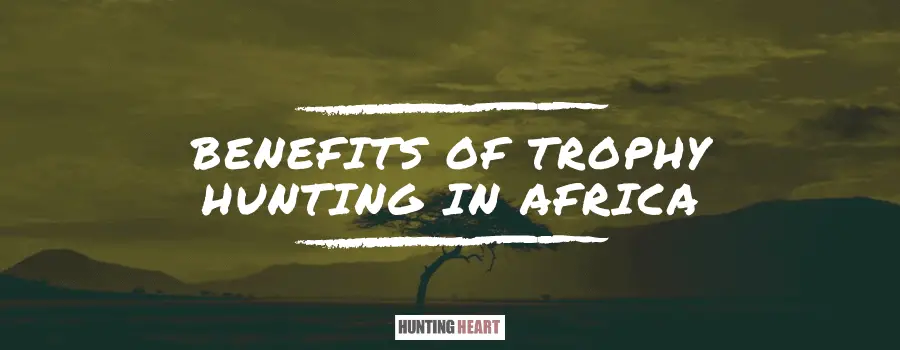As an Amazon Associate I earn from qualifying purchases.
Our Associate portal can be found here
According to Nat Geo, trophy hunting in Africa holds the most benefits compared to the other continents. Although some of these advantages are inapplicable in some developed regions, they still make a difference and are worth expounding on. These advantages brought about by the activity in question serve the local individuals and the animals habituating the area.
In this article, we will get to have a better understanding of what trophy hunting entails and its impact on Africa’s present status. As we are all aware, nothing good lacks a bad portion, neither does this activity. While outlining its advantages to the said continent, it would also be wise to shed some light on the adverse effects. Before thinking of purchasing a ticket for Africa, read through the article, and expound on your knowledge.
What is Trophy Hunting?
It would be unfair for me to assume that every reader is familiar with trophy hunting; hence this section expounds on the concept. Wikipedia describes this activity as hunting with the intent of parting with the animal’s body part, most likely the head, to act as a prize. With this definition, a beginner would find themselves disgusted by the activity. What good does it do to kill an animal, not for the meat but its antlers and hooves?
However, your view of trophy hunting might change once you get rid of the crude meaning and get to understand the basics. Most of the animals tracked and killed are predators who pose a threat to numerous species in the woods. Also, these hunters forego the young creatures and target fully mature prospects whose lifespan is almost halfway. These, and other reasons explained later in the article are why I find trophy hunting doing more good than harm to the environment.
Trophy hunting in Africa is exceptional in its way; not only are there rare species but also the hunting approaches favored differ from other regions. This is an essential aspect since the goal of the activity is to compete for the best score. The rarity of the victim determines the score, so the rare your kill, the better your winning chances.
The Benefits of Trophy Hunting in Africa
It Saves the Wildlife Habitat
Africa is still a growing continent, and with the current trend it is showing, it can develop into the likes of other continents fully. Constant development comes at a price as every unutilized piece of land is at risk of being converted into an income-generating structure.
It is for such reasons that the lands in which these coveted species habitat are at risk of being re-invented into something else. Trophy hunting in Africa ensures that this land remains a habitat as the activity still generates income for the local government.
Trophy Hunting Funds Conservation Movements
The amount of funds dedicated to the conservation and safekeeping of these habitats in Africa is insufficient to prove effective. Inadequate funds have always been an issue with African states; however, most of the income can be reinvested into the forests with trophy hunting. This money is more than enough to improve the present environmental conditions.
Smaller Footprint
Unlike tourism, trophy hunting means that fewer aliens will access the country, yet the revenue collected will surpass ecotourism. It is advantageous to the government as they are responsible for only a small portion of foreigners if things go sideways.
Also, the standards of living in these countries are incapable of supporting their current population. Therefore, it will become worse once other individuals increase the initial population. That is why it is paramount for the African countries to embrace trophy hunting as a means of revenue generation.
It Benefits Local People
As opposed to some of your mentalities, many individuals are involved in trophy hunting other than the hunters. People like guides, photographers, and even wardens must run a thriving location for this sport. For the local population, these are employment opportunities up for grabs. They also benefit from the money left behind by the participants, be it in tips or ticket payment.
It Will Instill a Sense of Responsibility
Naturally, the local population will find themselves making an effort to improve the species habitat. Actions like building and maintaining water points will become a usual way of life for them to protect them. This feeling is fueled by the knowledge that were it not for them; most of their revenue would be non-existent.
The Downsides of Trophy Hunting in Africa
Ethical Concerns
The idea of trophy hunting is yet to settle within Africa and is still considered unethical. Most Africans argue that killing an animal only to take its head and leave its body is cruel and inhumane. It would be different if the part taken were to be used medicinally, but most of them end up on walls as decorations. However, Africans need to take a step further to understand the morality of trophy hunting and the numerous benefits that come with it.
Over Killing
In Tanzania, reports of the rapid decrease in the Lion population fill the news every season. The main reason for such notices is that the number of animals hunted exceeds the scientific department’s stipulated limit. Note that the figure given is from numerous researches and calculations to ensure they remain existent.
Management Capacity
The government and population structure of most African countries are not as stable as you would expect. For this reason, the management capacity of these locations may be constricted to certain limits, meaning that decisions made will not be satisfactory. A weak governance system means that stubborn individuals can easily avoid many of the regulations put in place.
Conclusion
It is evident that trophy hunting in Africa is better than it seems or sounds, at least to Africans. Instead of focusing on the few negatives brought by it, why not bask in the benefits of such an enjoyable and adrenaline filled activity. Book yourself a trip to the continent for a first-hand experience.
Amazon and the Amazon logo are trademarks of Amazon.com, Inc, or its affiliates.

36 years old, been hunting and fishing my entire life – love the outdoors, family, and all kinds of hunting and fishing! I have spent thousands of hours hunting hogs and training hunting dogs, but I’m always learning new stuff and really happy to be sharing them with you! hit me up with an email in the contact form if you have any questions.


